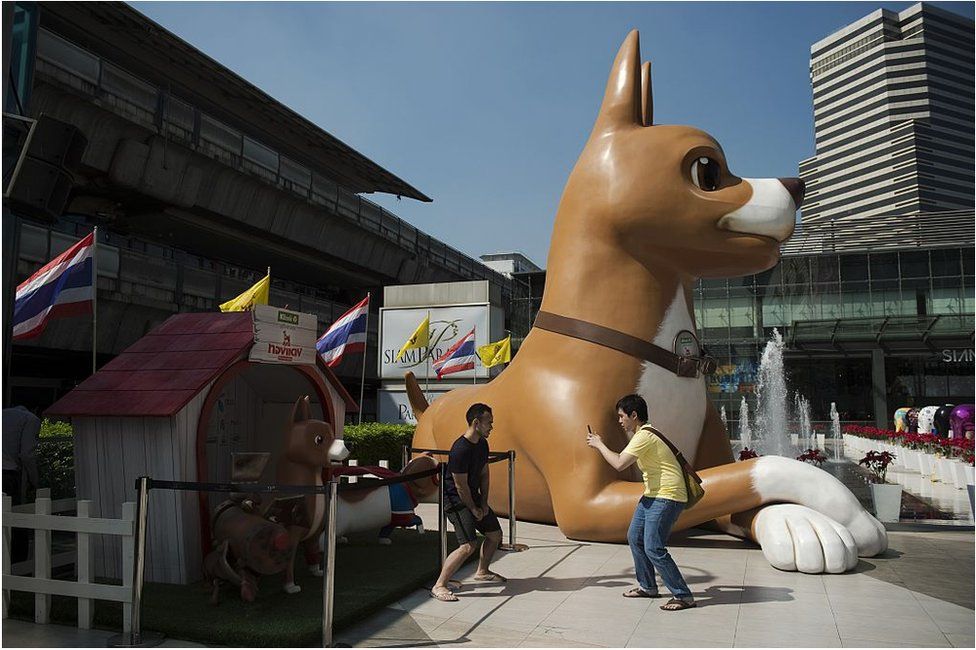Welcome to article 1/3 focused on cultural social media insights in Thailand. This article will cover key cultural facts and how they might impact your social media strategy! It’s important to remind yourselves to take a step back and remember what core to the success of your campaign is – your audience and what makes them tick. A brand will only succeed with a strong understanding of the market and its audiences.
To elevate our knowledge and conduct better campaigns for our clients, Digital Business Lab decided to partner with Dr. Crystal Abidin and conduct deep research in Singapore, Indonesia, Vietnam, and Thailand. Dr. Abidin, Ph.D. in Anthropology/Sociology/Media studies, is a researcher and educator who focuses on Asia Pacific Internet cultures. Specializing in influencer cultures, online visibility, and social media pop culture, her academic research can be found at https://wishcrys.com/academic-publications/.
For this series about Thailand, often referred to as ‘the Land of Smiles’, we will dig deeper into a country that is renowned for the welcoming and warm disposition of its culture and people. Many Thai people have embraced progressive ideas as their country has globalized. This is reflected in the country’s capital, Bangkok, which is a vibrant cosmopolitan city containing a melting pot of traditional influences and contemporary attitudes.
From a marketing perspective, Thailand is a country with rising affluence and the most social shoppers in the world. Its rapid urbanization and smartphone penetration are expected to accelerate future digital performance, giving brands a potential of a future eCommerce ecosystem with over 6 million new digital buyer opportunities to enter.
Cultural Thailand social media insights: Key facts
1. “Enjoy the present” mentality: Emphasis on pleasures
- A common saying in Thailand is “mai pen rai”, which means “never mind/it doesn’t matter”. It reflects a cultural approach that life “is to be enjoyed”. As such, alongside their “strong work ethic”, Thais are generally content with life.
- A related cultural concept is “Sanuk”, which reflects an “effort to achieve satisfaction in whatever one does” and to make the best of any circumstances (Cultural Atlas 2020)
- Thailand is experiencing a growing middle-income segment, which gives rise to higher demand for small indulgences, pleasure experiences, and luxury.
- The Thais’ beliefs are influenced by Buddhism’s belief in the present existence of life. They believe in savoring the present moment, which they can really influence, as they mean, “The past has passed, the present is a gift, and the future may never arrive.”.
- The younger generation is, even more, tend to spend on experience and instant gratification.
💡 Takeaway: As the Thais believe in enjoying the present moment, complementary with its rising affluence, brands/social media campaigns would be in a more desirable position to communicate the experience of contentment, the pleasure of living in the moment, or instant gratification.
See the following example: The Thai government efforts supported by Thai Airways to combat COVID-19 by rewarding Thai citizens and residents who stay home to stop spreading the virus. Source: https://www.thaiairways.com/
💡 Takeaway: The communication of living in the moment sits well even for categories that seem to be contrary to the idea.
See the following example: The Asian Development Bank (ADB) was able to convince first graduates or first jobbers that “saving is cool” by portraying themselves as lifestyle gurus.

2. Status is important: Uphold self-image
- Similar to many East Asian countries, Thailand value the concept of “face”, which refers to “a person’s reputation, influence, dignity and honor” (Cultural Atlas 2020)
- In Thai culture, status is extremely important, even if it isn’t immediately obvious. Age, family ties, work types, education, and income levels are all factors that influence a person’s social standing.
💡 Takeaway: As a nation that highly values “saving face”, brands should manifest this important cultural value and show respect through communication that emphasizes positive association with reputation, pride, or status in their Thailand social media campaigns.
See the following examples: how the Lèse-majesté (insulting the monarch) law is offended, a man faces up to 15 years in jail for mocking King Bhumibol Adulyadej by sharing pictures of the king’s favorite dog on Facebook. Source: https://www.bbc.com/news/

3. Collective mindset: Family matters
- The Thais’ attitude toward life and time spent is influenced by their collective existence. Time is better spent enjoying the moment with family and friends.
- Growing urbanization and worsening traffic conditions, especially in Bangkok, are driving demand for convenience. As a result, the Thais would go for time-saving options such as packaged food, convenience service, and convenience stores so as to spend more time with family.
- In Thailand, the family almost always comes first, with a much greater emphasis placed on the extended family than it typically is in western countries.
- There is no term for cousin in Thai, so cousins are referred to as brothers and sisters.
- It is common for extended families to live close to one another, and many Thais retain strong ties to their home villages even when they move away for work.
💡 Takeaway: When brands are trying to promote or sell a product/service, instead of communicating via the time-saving angle, one that demonstrates how convenience encourages them to spend more time enjoying themselves with family would be more appealing.
4. Health & appearance-conscious: Effortless matters
- Health is wealth. Thais believe that by maintaining good health, they will escape financial difficulties and burdens that would otherwise prevent them from fully appreciating the present.
- The vast majority especially the young generation tend to be interested in a healthy lifestyle without too much effort, so they spend a lot on healthier food options and supplement products, instead of exercise regularly.
- Influenced by social media, they are also very appearance-conscious, so they also spend their disposable income on the latest trends, gyms, cosmetic procedures, and plastic surgery.
- The younger generation is, even more, tend to spend on experience and instant gratification.
💡 Takeaway: When businesses are trying to promote healthy, beauty, or appearance-related products/services, it is recommended to emphasize the pleasure without the need to restrain oneself from indulgences, for example, effortless healthiness, etc in their Thailand social media campaigns.
5. Transgenders: See beauty, not gender
- Transgender people, also known as “Ladyboys,” are commonly accepted in Thailand and can be found in the fashion, beauty, and entertainment industries, but they are not officially recognized as women.
- Trans people have long been part of Thai society, there are human right groups such as “Thai Transgender Alliance” thrive to increase their acceptance and legal protections.
- As for trans-inclusive beauty campaigns, Thailand is leading the way. Major imported brands such as Sephora have seemed to grasp the opportunity trans inclusivity can present.
- It is considered disrespectful to mock the group negatively and stereotypically as humor, which the lesson can be learned from a Swedish retail giant’s ad that touched a nerve with Thai transsexuals.
💡 Takeaway: When brands are looking into penetrating the Thai population, one approach that could be considered would be celebrating the Thai trans community, people from all walks of life without gender boundaries. As the Thais are more open-minded towards it with high visibility across the country, such as Transgender beauty queen, etc, communications highlighting the trans’ positive personality traits, motivational stories, etc had successfully spark conversations about gender and stereotypes around the campaign.
See the following examples: Pantene Thailand, the country’s second major beauty brand to introduce trans-inclusive advertising, launched a successful marketing campaign that started with challenged common perceptions by asking the question, “What do you see?” And encouraged people to #SeeBeautyNotGender via popular social media in Thailand, such as interactive Facebook and Instagram stories, which in turn led people to discuss these issues on other online media platforms too.
6. Saving face: Respect through gifting
- When visiting a house or being hosted at an event, it is considered good manners to bring a gift. Fruit, flowers, liquors, and cakes are preferred. There is special pride taken in gift-wrapping (Cultural Atlas 2020)
💡 Takeaway: An addition to the concept of “face”, it would be advantageous for brands to offer online gift-related products/services such as gift sets assortments, gift with purchase, gift wrapping options, or bespoke brand packaging.
7. Yellow is associated with royalty
- Auspicious colors are gold and yellow for symbolizing royalty, and inauspicious colors are blue, black, and green for symbolizing death or mourning (Cultural Atlas 2020)
💡 Takeaway: When working on your visual identity for campaigns, you should take into account the meanings of different uses of color. For Thai audiences, the use of gold and yellow, endorsing royalty and prestigious status would best suit your brand if you are running a campaign for the celebration of King’s Birthday (Thai Father’s Day), weddings, or high-end businesses.
Important dates & celebrations in Thailand
- National & Political (exact dates vary if weekend)
- 6 April (exact date varies): Chakri Memorial Day, Founding of still-reigning Chakri royal dynasty in 1782
- 1 May: Labour Day
- 5 May: Wan Chatramongkol, Coronation Day, 1950 coronation of King Bhumibol Adulyadej
- 12 August: Queen’s Birthday, Thai Mother’s Day
- 5 December: King’s Birthday, Thai Father’s Day
- 23 October: Wan Piyamaharaj Day, King Chulalongkorn Day, Passing away of King Chulalongkorn/King Rama V
- 10 December: Constitution Day, 1932 adoption of constitutional monarchy
- Cultural
- 1 January: Western New Year’s Day
- April (exact date varies): Songkran, Thai New Year
- 31 December: Western New Year’s Eve
- Religious (exact date and month varies by the year)
- February: Makha Bucha Day, Full moon day of 3rd Lunar month when Buddha delivered core teachings
- May: Vesak Day, Visakha Bucha Day, Buddha’s Birthday
- July: Asana Bucha, Theravada Buddhist festival
Explore our other Market Researches in Asia
🇸🇬 Singapore Social Media Insights:
- ① Cultural social media insights in Singapore [ Research ]
- ② Social media marketing in Singapore [ Research ]
- ③ Online marketing in Singapore [ Research ]
🇻🇳 Vietnam Social Media Insights:
- ① Cultural social media insights in Vietnam [Research]
- ② Social Media Penetration in Vietnam [ Research ]
- ③ The popular Social Media in Vietnam [ Research ]
🇮🇩 Indonesia Social Media Insights:
- ① Cultural social media insights in Indonesia [Research]
- ② Social Media Penetration in Indonesia [Research]



